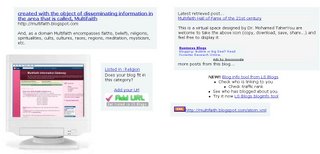Horizontal is an orientation relating to, or in parallel with the horizon, and the opposite of vertical. A horizontal line goes from left to right (or vice versa) where a vertical line goes from top to bottom.[source: Search.com]
And what are portals doing in this horizontal and vertical world:
Portals can be classified as either ‘horizontal’ or ‘vertical’; a horizontal portal caters to a general audience and provides a broad range of content and services; a vertical portal caters to a niche audience and provides more targeted offerings. [source]
On the Web, a vertical portal (sometimes called a vortal) is a Web site that provides a gateway or portal to information related to a particular industry such as health care, insurance, automobiles, or food manufacturing. (A vertical industry is one that is focused on a relatively narrow range of goods and services, whereas a horizontal industry is one that aims to produce a wide range of goods and services. Because most industry tends to specialize, most industry tends to be vertical.) A term that might also be used is interest community Web site since any vertical industry brings together people sharing an interest in buying, selling, or exchanging information about that particular industry. [source]
The data in this study identify very strong differences in advertising spending and preferences for each vertical industry. Zero in on the findings for the verticals your advertisers are in, and arm your sales team, marketers, and product planners with the hot buttons and non-starters we have identified."
"Vertical search appears to be the wave of the future for professional needs, so build focused subsets of information catering to specific user populations. More is not better; more personalized is. And also realize that “vertical” might mean alignment by job function, industry, subject matter/topic, or other meaningful aggregations that don’t fit the traditional ways information has been assembled."
"Vibrant Information Management staff possess many and varied competencies, and traditional research or librarianship skills are probably already well represented. Make the new required competency the core hiring attribute, with traditional information professional skills as secondary attribute." Roger Strouse
put aside Yahoo!’s FUSE (Find, Use, Share, and Expand) strategy for the moment and look at what the company is doing with vertical and horizontal search (horizontal search being, well, search). Yahoo! recently launched a specialized Travel site to go along with its other vertical sites and content plays.
If you go into Monster you can search jobs up and down the org chart in the Finance Sector. This is a vertical search.
a perspective on how horizontal and vertical seach are a part of a larger search matrix. interesting if google will ever cover all verticals.
Discusses the rationale, principles, required tools, advantages, and disadvantages of the Multifile Multidisciplinary (Horizontal) Search approach to searching online databases. It is noted that this approach is characterized by the use of a large number of files spanning a wide variety of disciplines.
They was the beginnings of the horizontal search engines - “horizontal search engines” - where the objective was to collect a maximum of information - rather of raw data - on the pages of the Web in order to make it possible to the Net surfers to more easily find them by simple keywords...
By the ultimate quality of information which it is judicious to produce, this diagonal research has a potential of valorization financiére enormous, much higher than the Pay-Per-Click keywords. [original source]
Google is currently building what I personally call "diagonal search": i.e., a combination of horizontal and vertical searches (Gnews, upcoming Gase, ravel icons already given here on this blog, etc...) Source: a commnet by Didier DURAND in another blog
Search 2.0 vs Traditional Search Written by Ebrahim Ezzy and edited by Richard MacManus. Ebrahim is lead developer and co-founder of Qelix Technologies, the company behind a search 2.0 contender called Qube. This 2-part series of posts is adapted from Ebrahim's research material in developing Qube.
April 5, 1999,
My previous post:
Searching Is Polarized; Will The Five Laws Get a New Revised Version: Every Search Engine Its Searcher






